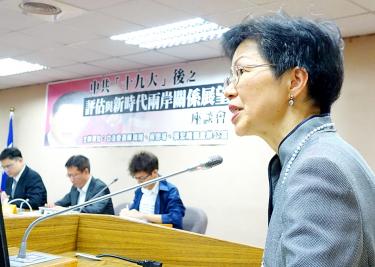Beijing is to exert more pressure on Taiwan by stepping up its dual strategy of draining the nation of its workforce while coercing Taiwan by diplomatic means, Mainland Affairs Council (MAC) Minister Katharine Chang (張小月) said yesterday during a forum discussing cross-strait relations following the Chinese Communist Party’s 19th National Congress.
While Beijing has not changed its policy toward Taiwan, despite incorporating Chinese President Xi Jinping’s (習近平) cross-strait “family” motif during the congress, it will continue its “dual strategy of courting and coercing,” Chang told the forum organized by Democratic Progressive Party (DPP) lawmakers at the Legislative Yuan in Taipei.
“Beijing will be softer on its soft strategy and tougher on its hardline strategy,” she said.
It would continue the “one generation and one stratum” policy to attract Taiwan’s younger generation and the grassroots stratum with occupational, educational and other preferential treatment in a bid to assimilate Taiwanese, Chang said.
On the diplomatic front, Beijing will redouble its efforts to impose the “one China” principle on the international community and curb Taiwan’s international presence, she said.
The cross-strait relations have moved to a new phase after the DPP administration took office in May last year, and both sides have to form a new mindset and put aside disputes to develop a peaceful and prosperous relationship, she said.
President Tsai Ing-wen (蔡英文) has reiterated that her administration would not change its goodwill or promises toward Beijing and would not return to confrontation or succumb to pressure, Chang said, calling on Beijing to start a friendly dialogue with Taipei.
Council Deputy Minister Chiu Chui-cheng (邱垂正) said Xi has not proposed any essential Taiwan policy, which might be put forward during his second term, adding that the council would be closely watching Beijing’s moves.
National Taiwan University politics professor Chen Ming-tung (陳明通) said there would not be dramatic changes to cross-strait relations in the next 30 years if Taiwan can maintain the strategic balance between Taiwan, China and the US.
Over a multilateral interaction spanning six decades, a strategic balance has been achieved between Taiwan, the US and China, with Taiwan achieving a peaceful autonomy, China preventing Taiwan from seeking de jure independence and the US preventing Taiwan from becoming a Chinese military base, Chen said.
Taiwan has to keep that balance while seeking to develop a new mode of cross-strait interaction, Chen said.
Tamkang University politics professor Chang Wu-Ueh (張五岳) said China is reshuffling its Central Leading Group for Taiwan Affairs, which is expected to be led by experts of China-US relations including Chinese Vice Premier Wang Yang (汪洋) and Chinese Ambassador to the UN Liu Jieyi (劉結一).
China-US relationship is the most critical bilateral relations to cross-strait and international relations, and Beijing’s new leadership group is the one that is most familiar with the US in history, and Taiwan needs to prepare for possible effects on cross-strait relations, Chang said.
Source: Taipei Times - 2017/11/01





















